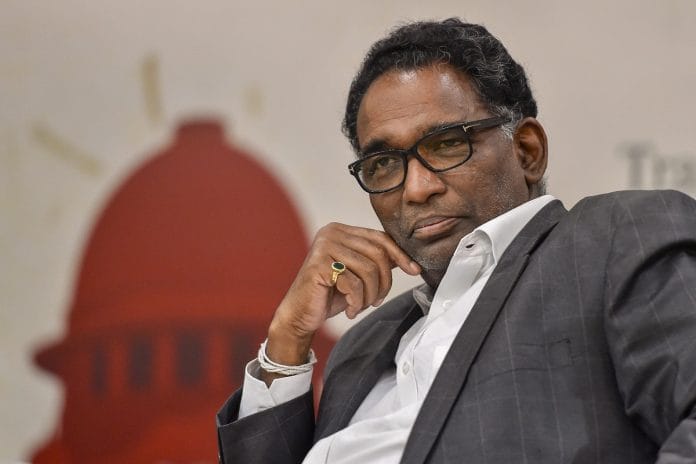The second most senior judge of the Supreme Court also criticises the practice of regional representation in the apex court.
New Delhi: Justice J. Chelameswar, the second most senior judge of the Supreme Court, has made a renewed case for objective criteria for judicial appointments.
“There is no objective assessment of performance of judges while elevating them to the apex court. It is mostly based on perceptions,” he said, speaking at the release of a book on appointment of judges Monday.
Paul Craig, professor of law at Oxford University and Arghya Sengupta, director at Vidhi Centre for Legal Policy, also took part in the panel discussion.
This was Chelameswar’s second public interaction in three days. He is one of four senior apex court judges who had launched a scathing attack on the functioning of Chief Justice of India Dipak Misra at a historic press conference in January.
He, however, refused to speak on the crisis involving the CJI and the senior judges.
Chelameswar criticised the practice of regional representation in the apex court.
“You have 31 judges. Every state believes it is entitled to a seat in the SC. That brought state-wise representation as a criterion which didn’t exist when you had fewer judges,” he said.
“More than one high court chief justice comes from the same state. If we were to consider only seniority, only one can be picked to SC and others are ignored,” he added.
When chief justices of high courts have a legitimate expectation to be considered for elevation to the apex court, regional representation is often seen as a road block, he explained.
Chelameswar also called for a larger debate on the transfer policy of chief justices of high courts.
“High court chief justices are transferred frequently as there is a fear that they could be influenced by the local clout and build empires. If that’s the argument, then why not have non-native chief ministers,” he asked.
Chelameswar also supported the idea of a permanent constitution bench in the apex court.
“A lot of referrals to constitution benches are because there are conflicting rulings of smaller benches. When interpreting the Constitution, it should be done authoritatively,” he said.







Is there no code of conduct for judges? If no, why not since every govt. employee is bound by conduct rules. If yes, what action has been initiated against the four judges who held the press conference and Chelameswar for his transgressions. Any other govt. employee would have been terminated by now for similar actions.
One genuine constraint is the relatively modest remuneration for judges of the apex court and the high courts. Some of the leading lawyers, who have now become household names, must earn more in a single, productive day than the judges before whom they appear do in a year. Judges also put in long hours of work, including the time required to dictate judgments. Quite a sacrifice, actually, to accept the post of a judge. Fortunately, there is lifelong pension, equal to last pay drawn, and now some very highly paid arbitration work. 2. While regional representation cannot be ignored, that consideration is largely satisfied at HC level. For the SC, given the stakes involved, it should count for much less.
A person would have considered the pros and cons before he offers himself for the post of a judge. Hence the arguments do not stand. As far as putting in hard work by a judge is concerned, it is nothing compared to what a corporate executive puts in – the number of hours they ( corp. ex) put in and the far reaching consequences of their decisions – the lives of so many people and their families depend on these decisions and the time they get to take these decisions. Compare it to the output of judges and you will realise what a cushy job these judges have. It is a 24X7 job for a corporate executive whereas a court has a summer / winter vacation, a puja vacation and so on. In fact, it would be easier to make an annual list of working days than a list of holidays for the judges. How many cases are decided in the life span of the petitioners? You must have heard the case of a postman whose case went on for nearly four decades and the case was that the postman is alleged to have embezzled a princely sum of Rs 5/-. The judges do not even bother to clean up their house periodically. No wonder there are undertrials for 30 – 40 years for petty crimes for which maximum punishment would have been a couple of months. It is said ” Justice delayed is Justice denied”. In which case who is getting justice nowadays. And the judges sleep on and on and on.
How was he himself appointed as AP High Court Judge at the age of 37 ? Was it on merit ? You should ask the advocates in AP High court Bar in Hyderabad ?